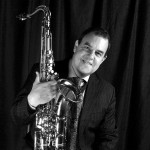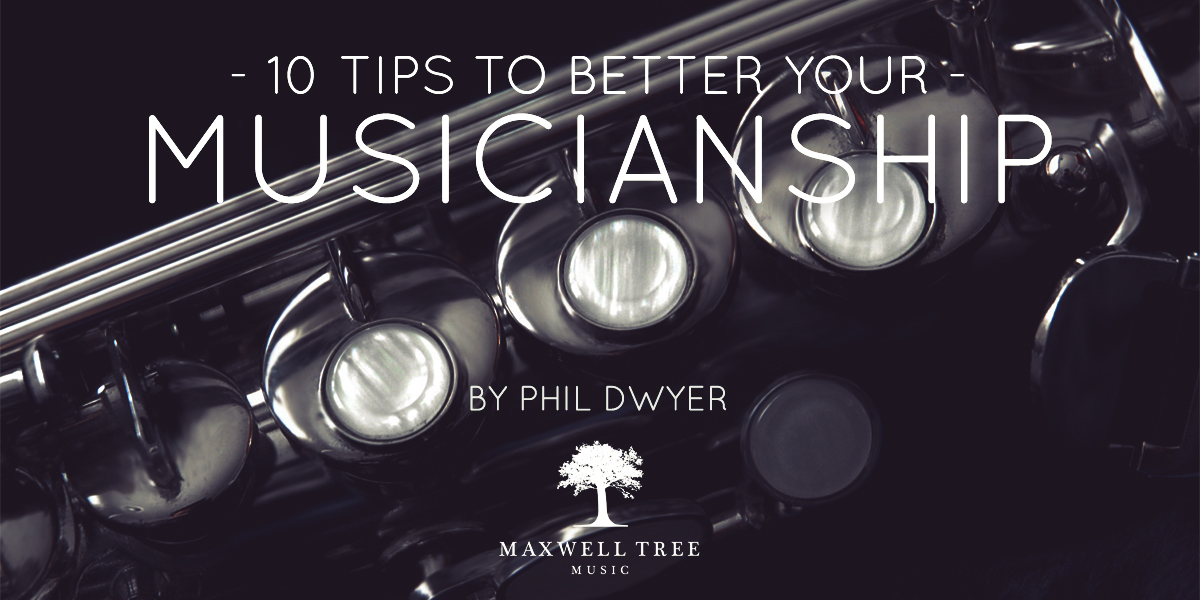By Phil Dwyer
- Remember that you have 2 ears and one mouth… don’t be afraid to ask questions, but often your questions will be answered anyway. Try to put yourself within range of people who are really good at what you want to do and learn by example.
- Develop an enthusiasm for what you are doing… cultivate a desire to increase your knowledge, from any source available. As with most things in life, the rewards are directly proportional to the attitude with which you approach your work.
- Work on instilling a deep sense of rhythm into your larger muscle groups… develop the ‘inner drummer’ within yourself. Get a pair of drum sticks and a practice pad or, even better, a ride cymbal and play along with records.
- Take good care of your body, and the mind will thank you for it. This means paying attention to diet, exercise, posture, and avoiding habitual behavior that doesn’t serve your goals.
- Try to spend some quiet time on your own using your imagination and listening to the messages that your mind is sending you. Turn off the electronic devices, read some books, practice gratitude. Try and develop an interest in the world around you, environmental, political, social…if possible refer to a variety of sources for your information. The world is shaped by the people who show up for the game. And most of the great artists reflected the world around them in their work.
- Train your ear and train your voice. Sing melodies, learn the words to standards.Try playing familiar tunes starting on random different notes. Learn tunes off the recordings instead of a fake book. Learn to recognize common harmonic progressions by focusing on the bass line.
- Listen to music with your friends (especially the ones you are playing music with), and talk about what made it great (or not). Develop your critical listening skills. Listen to how different players bring a certain something to recordings (like Freddie Hubbard’s swagger, Bill Evans’ harmonic depth, Chris Potter’s quirky twists and turns).
- Spend time focusing on the sound that you get on your instrument, not the notes, just the tone. Use a good role model to establish a clear mental picture of what sound you want to make. It’s good to have heroes on your instrument, that will help you set goals for yourself. Follow Clark Terry’s 3 step plan. Imitate… assimilate… innovate…
- When you are warming up, try a couple of things…- try to always play in tempo, so count yourself in before you start, and use tip #8 to create a clear mental image of how you want that first note to sound. Don’t noodle, try and play with a purpose at all times. Every time you play your instrument is an opportunity to learn and get better, even if it’s only for 5-10 minutes.- try to start off in a different key than the one(s) you are most used to. The different keys are not necessarily harder or easier, just more or less familiar. So, combining 9 a) and b) could mean counting yourself in and slowly and evenly playing an G#m9 arpeggio, or a Eb jazz minor scale.
- Show up on time, make sure your instrument is working well, don’t fool around at rehearsals, treat everyone with respect… help someone out if they ask for it, and don’t be afraid to ask for some help if you need it. Remember that tuning is something that you do all the time, not just at the beginning of the show. If you are a horn player, spend some time blowing warm air through your horn before you start to play, and then when you are playing keep the air moving>>>>>>>>>with some velocity!! If you are in the rhythm section, make sure you are listening to each other, and that your parts all fit together to create a big fat groove. Most of all… HAVE FUN!!!
 Phil Dwyer has been a fixture on the Canadian, and international, music scenes since he was a teenager. Phil lived in Toronto from 1988 to 2004, during which time he was a first-call sideman in studios, concert halls and jazz clubs. He was a featured performer, arranger, composer and/or producer on hundreds of recording sessions including Juno Award-winning albums with Hugh Fraser, Dave Young, Guido Basso, Joe Sealy and Don Thompson. MORE
Phil Dwyer has been a fixture on the Canadian, and international, music scenes since he was a teenager. Phil lived in Toronto from 1988 to 2004, during which time he was a first-call sideman in studios, concert halls and jazz clubs. He was a featured performer, arranger, composer and/or producer on hundreds of recording sessions including Juno Award-winning albums with Hugh Fraser, Dave Young, Guido Basso, Joe Sealy and Don Thompson. MORE

